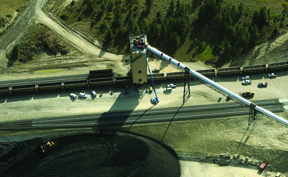
The Signal Peak coal mine in Montana. Photo by Larry Mayer/Billings Gazette.
by Anne Hedges
Signal Peak Energy wants its Bull Mountain mine to become the largest underground coal mine in the nation. Most of the coal that is currently mined is shipped to Asian markets. Fortunately, Signal Peak’s expansion plans hit a major snag last week due in large part to some great legal representation by Western Environmental Law Center’s Shiloh Hernandez.
In 2013 the State of Montana issued a permit to Signal Peak Energy allowing it to expand the Bull Mountain coal mine by more than 7,000 acres and adding 176 million tons of coal to the mine (about 110 million tons of mineable coal). MEIC challenged that decision before the Montana Board of Environmental Review (BER) based on a number of arbitrary decisions made by the Montana Department of Environmental Quality (DEQ) during the permitting process. Those decisions could have resulted in long-term contamination of water in the area– something coal mining laws are supposed to prevent.
On October 16, 2015, BER ruled, in a virtually unanimous decision (one concurring opinion) in favor of water quality protection. It agreed that DEQ’s decision to permit the mine expansion was arbitrary for a whole host of reasons. Area ranchers have depended on water from the Bull Mountains for generations and rely on DEQ to protect their water quality. BER agreed that DEQ had failed to do so and rejected the expansion permit for the mine.
That’s a big deal. Montana should not allow a large coal mine that is partially owned by a shady international commodity trading firm named Gunvor to jeopardize long-term water quality just so it can export Montana’s coal to Asia. Ranchers in the area will depend on clean water from the Bull Mountains long after the mine is closed.
Signal Peak Energy can appeal this decision to State district court, but it would be far better served simply to comply with state and federal coal mining laws that are designed to protect ground and surface water in the long run. Downstream water users deserve to have their water protected, not just at this coal mine but at every existing and proposed coal mine in the state. This decision is an important step toward making sure that happens.


great news! Sorry I am too poor to donate-but I think the Kochsuckers planned it this way-impoverish the people , keep them uneducated and underfed and they have no time to protest “minor” infractions of the public good. Republicans these days seem to feel those ranchers should just go buy bottled water for their stupid cows and quit whining about a little cyanide and chrome in the creek and quit regulating these poor capitalists to death!